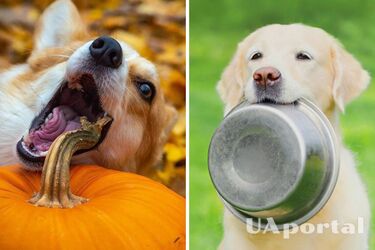Can dogs eat cereal and how it affects animal health

Grains in dog food are a controversial topic. Some people believe that grains are harmful to dogs because they are not their natural food and contain gluten or mycotoxins.
Others believe that cereals are an important source of nutrients for dogs and do not pose a danger to their health, elpais writes.
Read also: Should a dog be allowed to sleep in the same bed with the owner: advice from dog experts
Are cereals a natural food for dogs?
The answer to this question depends on what we consider to be natural food for dogs. If we consider natural food for dogs to be what they ate in the wild, then cereals are not natural food for dogs. Wolves, the ancestors of dogs, are carnivores, and their diet consists mainly of meat, bones, and internal organs. Grains are extremely rare in their diet.
However, if we consider that the natural food for dogs is what they ate during the domestication process, then cereals are the natural food for dogs. Since domestication, dogs have switched to an omnivorous diet, and cereals have gradually been included in their diet. Cereals are a good source of energy, protein, vitamins and minerals, so they have become an important part of the dog's diet.
Can dogs digest starch?
Dogs have the enzymes necessary to digest starch. However, compared to humans, dogs produce fewer of these enzymes. This means that dogs can digest starch, but not as efficiently as humans.
Do grains cause allergies or other diseases in dogs?
Grains can cause allergies or other diseases in dogs, but this is rare. Dogs, like humans, can be allergic to gluten. Gluten is a protein found in some grains such as wheat, rye, and barley. Gluten allergies can cause a variety of symptoms in dogs, including bloating, diarrhea, vomiting, and skin rashes.
Dogs can also be gluten intolerant. Gluten intolerance is not an allergy, but it can cause similar symptoms in dogs. Gluten intolerance can be caused by a variety of factors, including genetics and age.
In addition, grains can contain mycotoxins, which are toxic substances produced by fungi. Mycotoxins can cause a variety of conditions in dogs, including liver and kidney problems.
Is grain-free food better for dogs?
Grain-free foods are not always healthier for dogs than foods that contain grains. Grain-free foods often contain more protein than foods that contain cereals. However, too much protein can be harmful to dogs.
Grain-free foods also often contain more fat than foods containing cereals. This can be harmful for dogs that are overweight, obese, or have kidney problems.
In addition, some studies have shown that grain-free foods rich in legumes may increase the risk of developing dilated cardiomyopathy in dogs.
Conclusion
In general, there is no scientific justification for choosing a grain-free food for healthy dogs without known medical conditions. Grains can be beneficial for dogs if they are part of a balanced diet.
Here are some tips for choosing dog food:
- Choose foods that are formulated for your dog's age, breed, and activity level.
- Read the food label to make sure it contains all the necessary nutrients.
- If your dog has a medical condition, talk to your veterinarian about the best food for your dog.
Learn about the 9 most unique dog breeds.
If you want to get the latest news about the war and events in Ukraine, subscribe to our Telegram channel!
